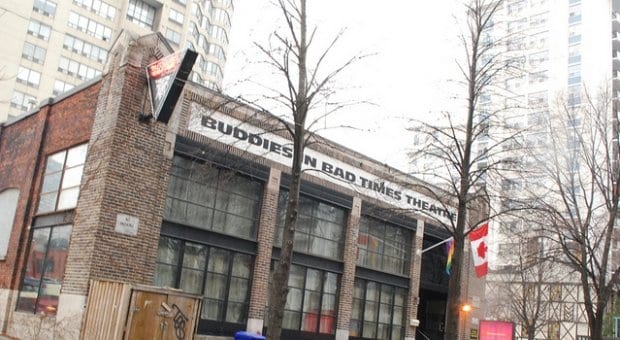Buddies in Bad Times Theatre announced Nov 28 that it has been rejected for a federal grant it was counting on to support its 35th annual Rhubarb Festival this February.
The Department of Canadian Heritage Grant, through the Building Communities Through Arts and Heritage Program, which Buddies had received every year with only one exception since at least 2008, ranged between $20,000 and $25,000. Buddies had asked for slightly more this year, hoping that the festival’s artistic success last year would qualify it for a larger grant.
But in a letter dated Oct 8, the department notified Buddies that its application was unsuccessful, saying only that the application was not approved under the department’s mandate “to fund projects designed to deliver measurable and tangible results, to optimize available funds, and to meet the needs of Canadians.”
Buddies’ artistic director, Brendan Healy, says that attempts to get a clearer answer from the department about why the grant was rejected were met with the same vague comments about the department’s objectives.
“It’s not that we didn’t get the grant. We don’t feel like we automatically deserve money. It’s competitive. We get it,” Healy says. “What’s disturbing is they haven’t told us anything about why we weren’t successful. It’s secretive and bizarre.
“It’s a much broader issue than that . . . around transparency, democracy, around government being held accountable.”
Unlike arts councils, which make decisions at arm’s length from government based on the evaluation of a jury of artists, decisions made by Canadian Heritage happen behind closed doors and with ministerial input, Healy says. That leaves the decision-making open to political interference and sudden policy changes that can leave applicants out of luck.
“There is an important duty on the part of the funder if there’s a sudden change in policy that could affect what you’re funding,” Healy says.
Canadian Heritage and Shelley Glover, the minister for Canadian heritage, did not respond to Xtra’s request for comment.
For its part, Buddies intends to go forward with the festival despite the lost revenue.
“We always are able to pull something off. We’re just going to pull off what we can,” Healy says.
This isn’t the first time this year a queer institution has seen its funding cut by Canadian Heritage. In May, Vancouver’s Queer Arts Festival announced that it had been notified that its $44,000 grant from the same program was not being renewed under the same circumstances. After a public outcry, the department reinstated 75 percent of the grant.
And in 2011, the SummerWorks Festival lost a $48,000 grant from Canadian Heritage’s Canada Arts Presentation Fund amid controversy surrounding the festival’s decision to stage a play the previous year called Homegrown, which was about the trial of one of the “Toronto 18” accused of plotting a terrorist attack in Canada. The ensuing outcry turned into a massive fundraising campaign for the festival, and federal funding was reinstated the following year.
Like SummerWorks, Rhubarb has left an indelible mark on the Canadian arts scene — and not just within the queer community. This year’s Governor General’s Award winner for playwrighting, Nicholas Billon, tweeted Nov 29 that his trilogy Fault Lines was developed in part at Rhubarb.
Comedian and actor Gavin Crawford wrote on Buddies’ website, “The experience and opportunity Rhubarb gave me was instrumental in my development as an artist. Rhubarb has consistently given emerging artists an incredible platform to experiment and to further their work. If the Heritage Minister can’t find ‘measurable and tangible results’ she is certainly not looking for them.”


 Why you can trust Xtra
Why you can trust Xtra


